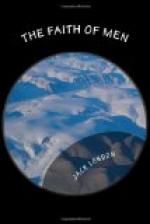It was very lonely at Twenty Mile. The bleak vastness stretched away on every side to the horizon. The snow, which was really frost, flung its mantle over the land and buried everything in the silence of death. For days it was clear and cold, the thermometer steadily recording forty to fifty degrees below zero. Then a change came over the face of things. What little moisture had oozed into the atmosphere gathered into dull grey, formless clouds; it became quite warm, the thermometer rising to twenty below; and the moisture fell out of the sky in hard frost-granules that hissed like dry sugar or driving sand when kicked underfoot. After that it became clear and cold again, until enough moisture had gathered to blanket the earth from the cold of outer space. That was all. Nothing happened. No storms, no churning waters and threshing forests, nothing but the machine-like precipitation of accumulated moisture. Possibly the most notable thing that occurred through the weary weeks was the gliding of the temperature up to the unprecedented height of fifteen below. To atone for this, outer space smote the earth with its cold till the mercury froze and the spirit thermometer remained more than seventy below for a fortnight, when it burst. There was no telling how much colder it was after that. Another occurrence, monotonous in its regularity, was the lengthening of the nights, till day became a mere blink of light between the darkness.
Neil Bonner was a social animal. The very follies for which he was doing penance had been bred of his excessive sociability. And here, in the fourth year of his exile, he found himself in company—which were to travesty the word—with a morose and speechless creature in whose sombre eyes smouldered a hatred as bitter as it was unwarranted. And Bonner, to whom speech and fellowship were as the breath of life, went about as a ghost might go, tantalized by the gregarious revelries of some former life. In the day his lips were compressed, his face stern; but in the night he clenched his hands, rolled about in his blankets, and cried aloud like a little child. And he would remember a certain man in authority and curse him through the long hours. Also, he cursed God. But God understands. He cannot find it in his heart to blame weak mortals who blaspheme in Alaska.
And here, to the post of Twenty Mile, came Jees Uck, to trade for flour and bacon, and beads, and bright scarlet cloths for her fancy work. And further, and unwittingly, she came to the post of Twenty Mile to make a lonely man more lonely, make him reach out empty arms in his sleep. For Neil Bonner was only a man. When she first came into the store, he looked at her long, as a thirsty man may look at a flowing well. And she, with the heritage bequeathed her by Spike O’Brien, imagined daringly and smiled up into his eyes, not as the swart-skinned peoples should smile at the royal races, but as a woman smiles at a man. The thing was inevitable; only, he did not see it, and fought against her as fiercely and passionately as he was drawn towards her. And she? She was Jees Uck, by upbringing wholly and utterly a Toyaat Indian woman.




